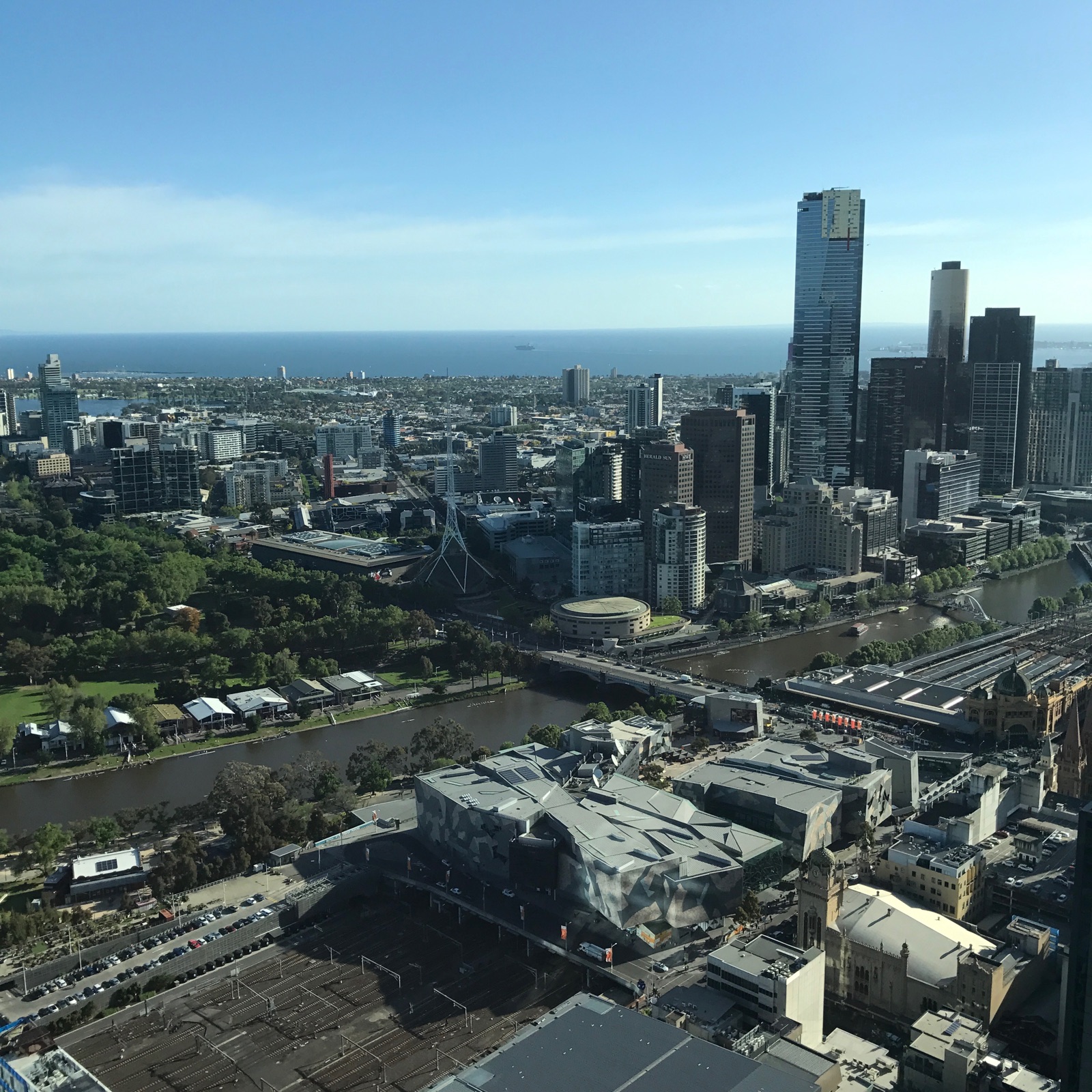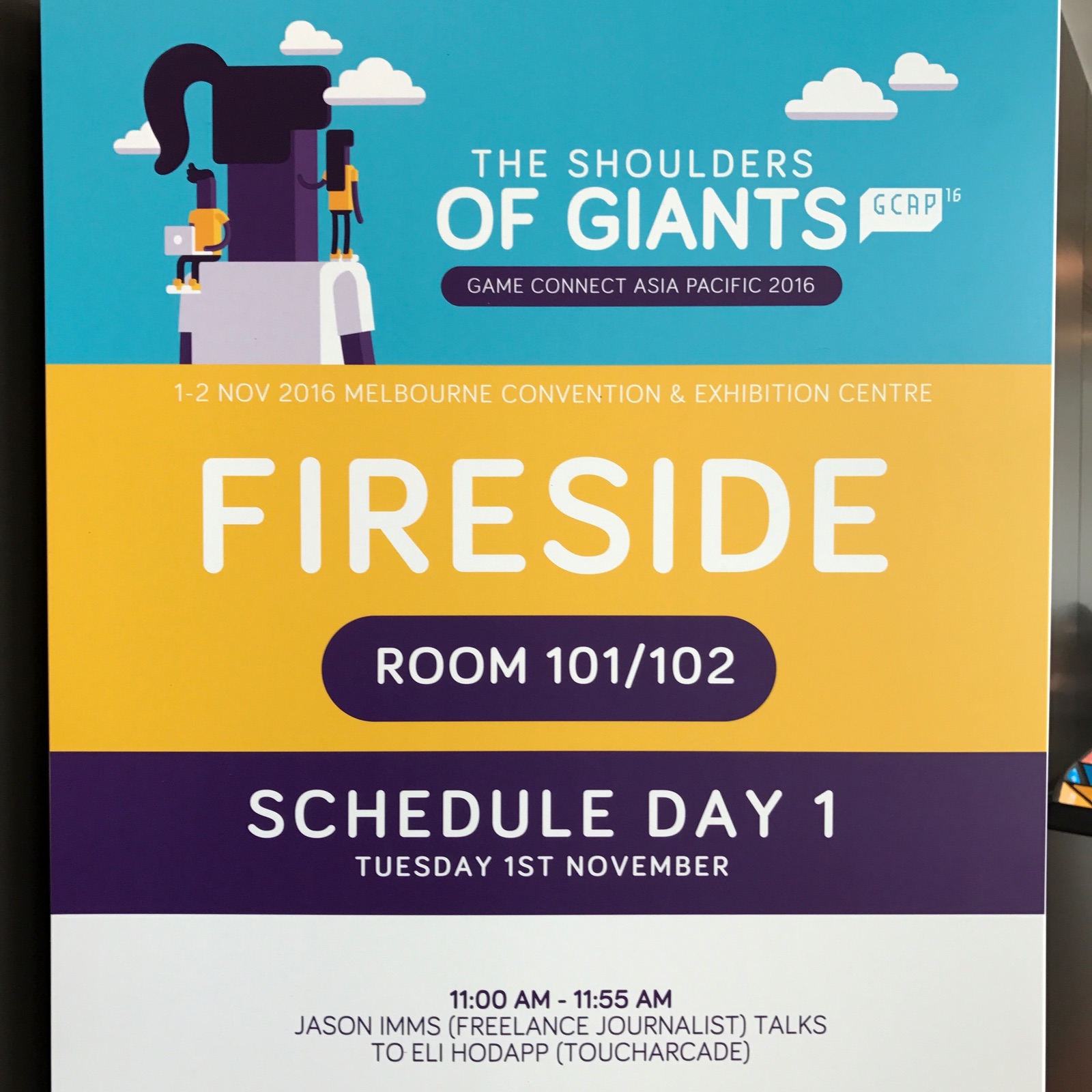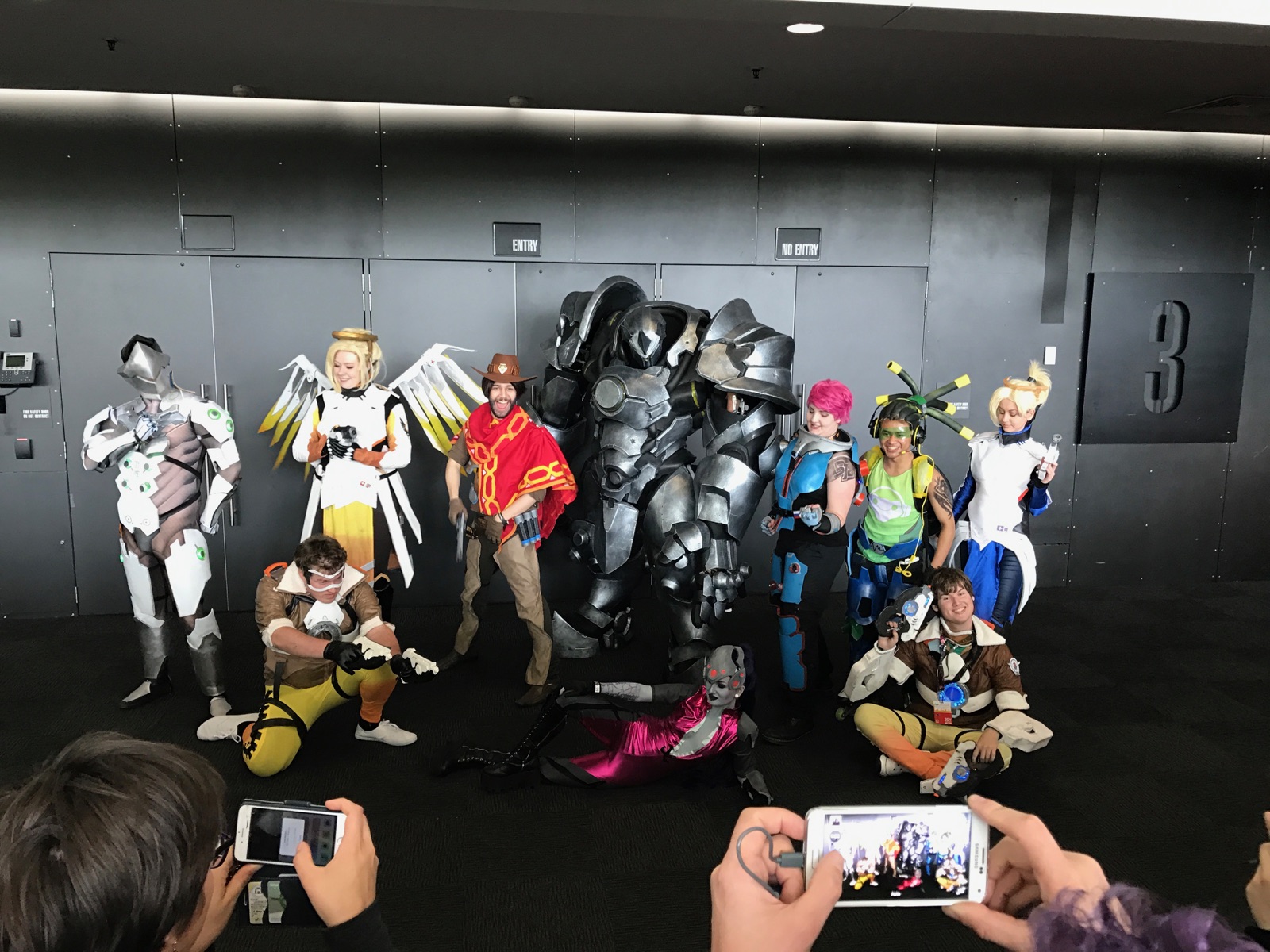 As I’ve mentioned a few times now on TouchArcade between the original announcement and two different episodes of our podcast, I was lucky enough to be invited to Australia by the Melbourne International Games Week Visiting Journalist Program (say that three times fast) courtesy of Invest Victoria. It seemed like the objective of the whole thing was to bring foreign journalists like me, who don’t have the resources to ever realistically get to Australia, and basically just let them discover how frickin’ rad the Australian development scene is. (It worked, maybe too well.) I spent all my time in Melbourne, but the cool part of it being Games Week was that basically every Australian developer from all the other major development hubs were also in town, making for an absolutely unforgettable week.
As I’ve mentioned a few times now on TouchArcade between the original announcement and two different episodes of our podcast, I was lucky enough to be invited to Australia by the Melbourne International Games Week Visiting Journalist Program (say that three times fast) courtesy of Invest Victoria. It seemed like the objective of the whole thing was to bring foreign journalists like me, who don’t have the resources to ever realistically get to Australia, and basically just let them discover how frickin’ rad the Australian development scene is. (It worked, maybe too well.) I spent all my time in Melbourne, but the cool part of it being Games Week was that basically every Australian developer from all the other major development hubs were also in town, making for an absolutely unforgettable week.
To back things up a bit, in the USA there’s no shortage of different games conferences to go to. I’d say the big ones for us would be GDC, E3, and PAX, but there’s also Casual Connect, 360iDev, and really too many other conferences I’d go to if I had infinite money. The problem is, with rare exception, these conferences are scheduled all over the year and all over the country. So, attending each individual conference is its own substantial investment in airfare, hotel, and associated expenses. These things are expensive, so we really just focus on GDC, E3, and PAX. Typically they offer the best “bang for the buck" (for lack of a better way to put it) when it comes to developers we’re able to meet and things we’re able to see that would be relevant to our readers.
Quite literally on the other side of the world, someone came up with a way better idea, and that’s Melbourne International Games Week. Instead of cherry picking which conferences you can afford travel to, you just travel to one place, and all sorts of different things are happening all week. For my purposes with TouchArcade, my primary objectives were spending time at Games Connect Asia Pacific (GCAP), PAX Australia, and attending as many of the seemingly endless networking events to meet as many Australian developers as I could to hear about what they’re working on. It was absolutely f*cking fantastic, as each smaller event that made up the greater Games Week event attracted a slightly different type of person who seemed to have that specific part as their primary focus but stuck around the rest of the week too. This lead to, quite honestly and without hyperbole, the most extremely diverse gaming conference I’ve ever been to both in the actual attendees themselves as well as the focuses of the different sub-events that make up the whole of Games Week.
The side effect of so many folks coming for the entirety of Games Week lead to a vibe that I’ve really never felt before at a conference (or, I guess, rapid-fire series of conferences). You get there, and particularly being an American in a totally new country, it was like when your mom drops you off at summer camp. Everything is just different enough to feel a little weird, you don’t know many people, and you look at your schedule of all the stuff you have to do and can’t help but feel totally overwhelmed. Then, through the magic of just always running into the same people who are all there for the same reasons as you, you make fast friends. The Australian game developer scene is absurdly welcoming, to the point that when I was leaving MegaDev (the giant party that more or less concluded my trip) I was genuinely bummed that I’d be getting on a plane the next day instead of hanging out with all the incredible people I’d spent my week mingling with. Again, just like leaving summer camp, where things went from being weird to yelling out the window of your parents’ car as you drive away, “Don’t forget to write!"
It also was incredibly cool having the opportunity to meet so many Australian developers who had the same basic reverse problem as me in that getting to the USA is expensive, and not super realistic particularly when you’re working for a tiny scrappy company like TouchArcade or any similarly sized indie studio. While we’ve already got a bunch of PAX Australia content on the site, there’s going to be much, much more that comes out of the people I met who were working on supremely impressive things they’re just not quite ready to share publicly with the world. As I met all these different developers, one really strange realization started to seep through: Whether or not it’s actually true, it really felt like the entirety of the indie dev scene in Australia exists because of Halfbrick’s inability to retain talent.
When you talk to indie developers in the USA, and they tell you their history, it’s rare to run into two people who both got their start at the same place. In Australia, it felt like everyone was from Halfbrick– The most famous would probably be the core team of Prettygreat, as they were directly responsible for the hits that truly put Halfbrick on the map. Other indie developers might have played smaller roles in popular games, but since leaving the company either went on to achieve greatness with their own successful titles or have projects in the works that are of similar sky-high quality.
Everyone had different theories for why Halfbrick seemed to have such a high churn rate of incredibly talented individuals, but you’ve got to wonder if eventually there won’t be some kind of Halfbrick post-mortem tell-all from someone high up in the company that gets to the bottom of what about their culture was the catalyst to great games like Landsliders and many others by ex-Halfbrickers getting made by people who left outside the studio instead of cultivating those titles and rewarding that creativity internally. It’s really strange, and feels like a massive mistake must have been made on Halfbrick’s part, but in a way you sort of have to be thankful for whatever happened to seemingly spawn this wonderfully blossoming industry.
Anyway, my time at Games Week kicked off at GCAP, which is a small conference held in the upstairs corner of the Melbourne Convention and Exhibition Centre. I wasn’t really sure what to expect, as in my limited experience of attending smaller events in the US, the people who typically attend are local developers along with potentially a few big name speakers. If you are looking to network with the best and brightest of the Australian game developer scene, or hear them talk, GCAP is the place to be. Whether it was intentional or not, the size of the event really did a great job of creating that “summer camp" vibe I mentioned earlier. Lunch and afternoon snacks are provided, so everyone just hangs out all day. I wish I would have had time to see more of the speakers, but it felt like my time there was a chain of being introduced to people who would then introduce me to someone else, and having great in-depth discussions about how TouchArcade works, what they’re building at the moment, along with other, super relevant topics. That is, until my scheduled fireside chat with prolific Australian games journalist, Jason Imms, which more or less turned me into a low-level Games Week celebrity.
If you’ve never been to a fireside chat (or the endless other similar things that have their own clever names) the basic idea is it’s an unscripted totally candid conversational interview with relevant people in an industry who might have an interesting story or something otherwise fascinating to talk about. Before I left for Australia, Jason had sent me an incredibly polite email asking if there was anything I wanted to talk about or anything I didn’t want to talk about, and, well, I figured I’ll be in Australia, none of this is being recorded, so what’s the worst that can happen?
Weaved somewhere in between the typical questions covering my background before TouchArcade, my day to day life, dealing with any loneliness that comes from working from home, and other similar topics came “Are you a Juggalo?" and a seemingly innocuous chat about American gun culture. I knew guns were incredibly difficult to come by in Australia, but I was totally unprepared for just how fascinated the Australians I talked to the rest of the week would be about this- The climax of which being meeting the developer behind The American Dream, a upcoming VR game where you do everything with guns. So, questions about guns were added to many conversations, sometimes even before “How do I get my game on TouchArcade?" The amusement was mutual, between random Australian devs thinking we’re so crazy, and me thinking, “You know, the more I explain this to people who this sort of thing isn’t totally normal to, the crazier it all starts to sound."
Aside from the hilarious turn of events at my own fireside chat, the rest of the talks I did get to experience were incredibly insightful and often hard hitting. It’s supremely difficult to put my finger on my favorite talk I attended, but if I had to say just one it’d be Ian Hamilton’s presentation on mobile devices and gamers with disabilities. Ian is a contributor to GameAccessibilityGuidelines.com, which is a fabulous resource for all the things you can do to make your game more accessible. His talk basically summed up many of the things on his site, but he had slides with many examples of what games can look like to people with visual impairment, along with the devices and methods people who are movement impaired use to interact with their mobile devices. As an able bodied adult, whenever I hear anything about accessibility in games, apps, and devices I just think, “Oh, it’s great they’re adding that," and that’s about where it stops. It never really crossed my mind just how minor the changes developers need to make to their software that can make the difference between a disabled person being totally unable to use/play it, to it potentially turning into a major component of their lives.
Ian’s web site is absolutely chock full of examples of best practices, but what was the most surprising to hear is that a good deal of the heavy lifting when it comes to accessibility is already baked right into iOS, and adding quite a bit of accessibility support is just a matter of making it so the existing iOS system-level functions work inside of your app. It actually resulted in me asking quite a few developers I met the rest of the week if they thought about adding accessibility features to their games, and like me, most of them just hadn’t thought of it or realized how easy it could be. While it’s unlikely that spending the extra time adding these features are going to result in any massive surge in sales, we know first hand how incredibly appreciative disabled gamers are when you take the time to let them play your games.
 A few dinners and late-night networking events later (including the massive Australian Game Developer Awards), and I found myself invited to the 2016 Women in Games Luncheon, which was hosted by Film Victoria. As the name might suggest, it was a lunch filled with all the women of Games Week, along with a few additional guests like myself. I wasn’t really sure what to expect, but what I found might have been the most inspirational two hours in recent memory.
A few dinners and late-night networking events later (including the massive Australian Game Developer Awards), and I found myself invited to the 2016 Women in Games Luncheon, which was hosted by Film Victoria. As the name might suggest, it was a lunch filled with all the women of Games Week, along with a few additional guests like myself. I wasn’t really sure what to expect, but what I found might have been the most inspirational two hours in recent memory.
Unfortunately, it seems like all too often you’re hearing about how the games industry can be hostile to women, or at least, nowhere near as welcoming and inclusive as it should be. This was reinforced by game designer Kim McAuliffe who through an interview by Giselle Rosman of Hipster Whale told her story of all the obstacles she needed to overcome to get where she is right now. These sort of things are always difficult to hear about, and even more difficult to write about, since as a straight white dude none of this is something I never need to deal with, and it feels exceedingly unfair that anyone does.
The good news is, support was overflowing at the Women in Games Luncheon, and the overwhelming message was “We’re not going anywhere, we’re not giving up." It was just truly awe inspiring, and left me thinking that every game development hub needs groups and events like these, as the positivity was simply palpable.
Another dinner and networking event later, and I found myself at PAX Australia. I’ve covered the experience pretty extensively here but here’s the basic gist:
It really doesn’t matter what you’re into, if it falls anywhere inside of the spectrum of geek culture, it’s there. Card games, board games, tabletop games, retro games, PC games, cosplay out the wazoo, console games, art of all kinds, anime, all sorts of swag to shop for, and so much more. PAX culture is also incredibly welcoming and diverse, so if you’re a PC gamer and have always been curious about learning how to play Warhammer, there’ll be people who will teach you. If you’re into Magic the Gathering and are curious about Dungeons & Dragons, there’s loads of newbie friendly encounters to drop in to. The list goes on and on.
I also spent a ton of time shooting a video trying to capture what it felt like being at PAX, and really, I’m not sure it does it justice as there’s really just something about being somewhere that has so many people all sharing a love for one thing that it feels like it has a life of its own. Even if you can’t make it to PAX Australia, you need to go to a PAX.
Following my final dinner in Australia, and after eating some oddly controversial (but delicious) kangaroo, Ken Wong of Mountains (who you probably know from the game Monument Valley) candidly asked if I wanted to come see his office, which he kept referring to as The Arcade. I’d been to a million game studios before, but never one that had such a cool name, so I figured why not. What I discovered at The Arcade, of all the things I saw during Melbourne International Games Week, really has me wondering how I can either get something like that here or just move there.
I sort of figured The Arcade was just the nickname Ken gave his office, maybe because they had a few arcade machines, who knows. In the midwest, if you’ve got horses and have a farm, you typically name that farm something that sounds fancy. This seemed similar. What The Arcade actually is, is the world’s most intensely radical co-working space. Personally, I’ve never been much into the co-working thing. What I do is super specialized, hard to explain to other people, and I really don’t have a whole lot to gain by paying a few hundred bucks to get a shared desk somewhere when I’ve got a perfectly good desk (not just a desk but a treadmill desk) in my office at home. All these feelings changed as soon as I stepped inside of The Arcade.
Take your mental image of a multi-level co-working space, except toss out all the random lawyers, realtors, IT professionals, and other people who end up co-mingling there and stuff the building so full of game developers that they’re practically working on top of each other. That’s The Arcade.
I’m not at all exaggerating either, here’s some of the companies that have set up shop in The Arcade:
- Dime Studios
- Double Jump
- Fluffy Kitten Studios
- GEEIZ
- GOATi
- Grapple Gun Games
- Harmonious Games
- Hipster Whale
- League of Geeks
- Loveshack Entertainment
- Lumi Consulting
- Many Monkeys Development
- Mighty Games Group
- Mountains
- Samurai Punk
- Surprise Attack
- The Music Room
- The Voxel Agents
- Tin Man Games
- Unity
- Well Placed Cactus
- Yak & Co
- Yodo1
You can pay per day or per month to work at The Arcade, and it’s run as a non-profit that basically just exists so all the developers in Melbourne can have an incredible space to work. Additionally, when you saw how game developers in Melbourne actually work day to day, it suddenly made perfect sense why all the games that come out of Australia are so incredible if this sort of thing is just… normal. It’s unbelievable. If you’re curious about how the nuts and bolts of The Arcade works, along with their pricing, take a look at their web site which has all that and more.
Visiting The Arcade was the perfect end to my trip to Melbourne. The things both the Australian government as well as the local community have done to help game developers has put Australia among the best places (I’ve been so far, anyway) to develop games in the world. I’m incredibly appreciative to have been able to have this experience, and am definitely going to need to come up with a way to get back to Australia, hopefully for longer so I can also see what’s going on in the Brisbane, Sydney, Perth, Gold Coast and other Australian game development scenes as well.



